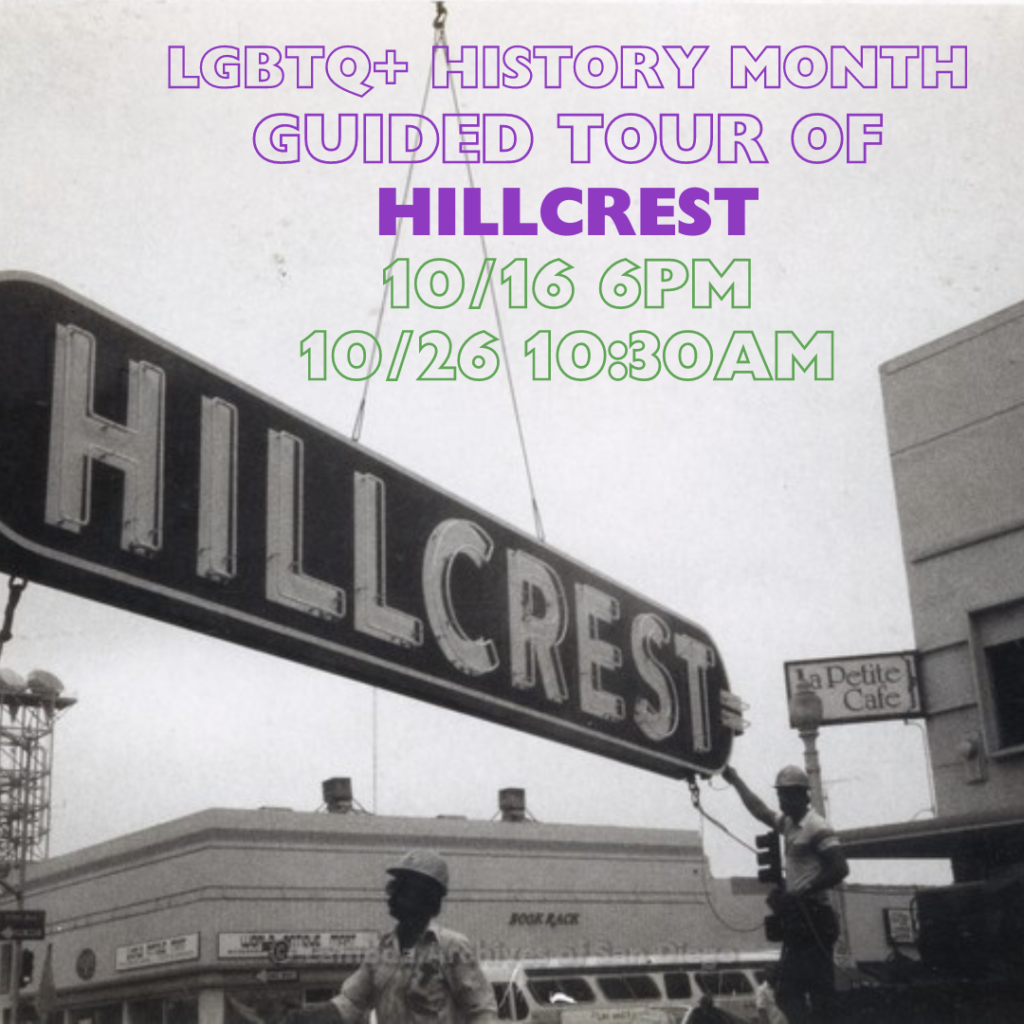Dear Lambda Archives Community
By Zach Shattuck
Whenever I share LGBTQ+ history—whether through a casual conversation or during a guided tour of Hillcrest for Lambda Archives—I strive to bring that history to life. History, after all, is a complex web of actions, emotions, and people—more like a dramatic novel or an exciting comic book than the dry list of dates and names it’s often reduced to. We tend to forget that history isn’t just about the past—it’s connected to the world we live in now. It shapes who we are and the communities we build.
To understand history as a web rather than a timeline is crucial. So much happens at once, with immediate effects and repercussions that may not be fully realized until decades later. Yet, no one can truly capture all these intricacies at once because we’re bound by the limitations of time and communication. When I present history, whether through a lecture or a tour, I’m aware that each presentation could be expanded into hours or even college courses. But there are practical constraints—both in terms of the audience’s attention span and the human capacity to speak for long stretches.

This means that every historian, myself included, must craft a metanarrative—a larger story that condenses history into a manageable, linear form for audiences. The challenge with this is deciding what to include and what to omit. How do we ensure that our metanarratives are accurate and fair, and what unintentional biases might we introduce? There’s no clear formula, but I’ve developed my own guiding principles over time.
It’s important to recognize that traditional metanarratives are often riddled with problematic biases. Many stem from the Enlightenment period, where the belief emerged that academics could write from an objective, emotionally removed standpoint. This was especially convenient for justifying European colonialism, as emotionally detached narratives could easily ignore or gloss over the brutal realities of oppression and violence. This practice continues today, with historical accounts often prioritizing the perspectives of official documents over the lived experiences of marginalized people.

Consider San Diego’s Gay-Ins of the early 1970s. Lambda Archives has preserved the oral histories of activists like Stephen Bell, along with photographs of community members protesting police harassment. But how different would our understanding of those events be if all we had were police records? If the only documents that survived were from a police meeting where officers expressed homophobic views, the story would be distorted and one-sided. The perspectives and voices of the LGBTQ+ community would be lost.
At Lambda Archives, we prioritize community-driven history, which allows us to expand beyond traditional sources like government records although we have those, too. We collect oral histories, personal items like a pair of Doc Martens, and student papers from a 1980s human sexuality course. This approach helps us preserve not only the voices of marginalized people but also the culture and humanity behind their experiences.
Recently, I’ve been involved in revamping the metanarrative for our Guided Tour of LGBTQ+ History in Hillcrest. One major change is that the tour is now split into two parts: Hillcrest East and Hillcrest West. There’s some overlap between the two for those who want to take both tours, but the division allows for a more focused exploration of the area’s rich history.

Another change reflects a shift in our anticipated audience. In the past, many tour attendees were already familiar with LGBTQ+ history, so we didn’t need to go into detail about broader historical contexts like the Lavender Scare or the impact of World War II on the gay bar scene. But today, many younger people are less familiar with these aspects, so it’s become important to incorporate them into the narrative.
The new tour also addresses the ways in which certain stories were historically excluded. Even within the LGBTQ+ community, hierarchies of oppression exist, with some groups—particularly LGBTQ+ people of color—being marginalized. For example, previous versions of the tour left out significant organizations like Lesbians and Gays of African Descent United (LAGADU) and the Gay and Lesbian Asian Social Support (GLASS) group, despite their presence in Hillcrest. The revamped tour now includes these important stories, along with others such as the drag bar Tidbits, Winn’s Barbershop, and the spot where Marti Mackey gave a live reading.
Recrafting metanarratives is an ongoing process that requires us to confront institutional biases, both large and small. It’s the responsibility of everyone who shares history to ensure that their narratives are inclusive and representative of the diverse communities they document. I encourage you to explore this new metanarrative for yourself by joining us for Lambda’s guided tour of Hillcrest East and West.

Tickets Can Be Purchased Here:
Guided Tour of Hillcrest
Wednesday, October 16th 6pm
Saturday, October 26th 10:30am

